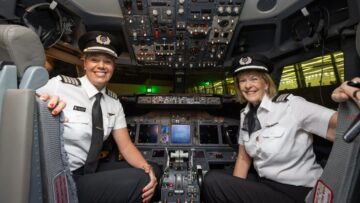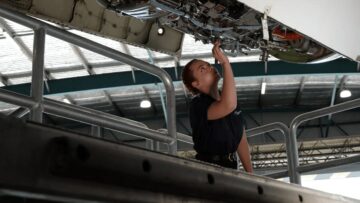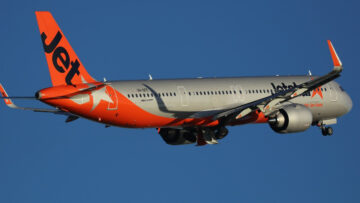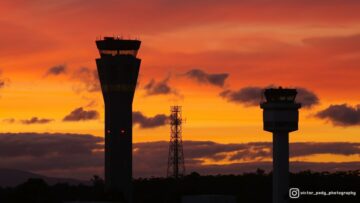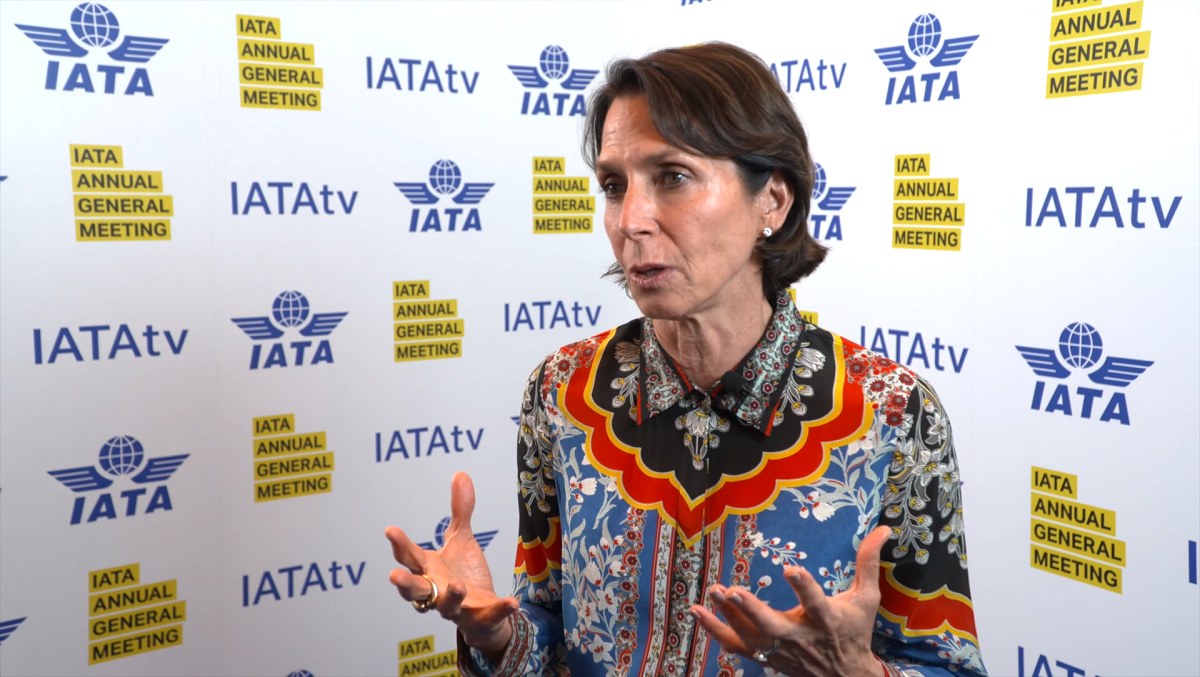
The CEO of Virgin Australia has said she believes the federal government was originally planning to grant Qatar extra flights into Australia but changed its mind after Alan Joyce told Transport Minister Catherine King he was “not happy” about the decision.
Speaking at the Senate on Wednesday, Jayne Hrdlicka said the transport minister personally told her about the then-Qantas CEO’s views in January and added that he requested a meeting to discuss the decision.
The federal government then announced in July it was denying the Middle Eastern airline the right to increase its frequency into Sydney, Melbourne, Brisbane and Perth from the current 28 flights per week.
Minister King later stressed that no single factor spurred the decision, which she has repeatedly said was made according to “national interest”.
Hrdlicka, however, appeared to strongly hint that she believed Alan Joyce’s views may have swayed her decision. She first met with King in January, where she said she was led to believe Qatar, a codeshare partner of Virgin, would be granted the flights.
“Based on this conversation, I felt comfortable that Qatar would be granted additional air rights. I was so sufficiently comfortable that I did not raise [the issue] with the prime minister when I saw him at the Australian Open in January as part of my responsibilities as the chair of Tennis Australia,” Hrdlicka said.
She later said that the Minister also revealed that Alan Joyce “had heard that her department was recommending negotiations with Qatar should commence, and he was not happy and had asked to speak with her.”
Hrdlicka’s comments came a day after Virgin’s written submission to the inquiry hit back against talking points from those opposed to expanding Qatar Airways services into Australia’s major airports.
PROMOTED CONTENT
Christian Bennett, chief corporate affairs and sustainability officer at Virgin, said the argument that Qatar could increase its services into other Australian airports outside the major gateways “ignores the commercial and customer reality of supporting Australia’s largest nodes of inbound and outbound passenger demand”.
“Nonetheless, the argument is illuminating in that by calling for more capacity from Qatar into Australia, but just not on the four key ports, it reinforces the perception that the decision to reject QCAA’s request was designed to protect the already dominant position held by the [Qantas-Emirates] partnership,” he wrote.
“What is more perplexing is that this argument is made when Qantas itself has historically had its own distinct preference for international flights from Sydney.
“As the Premier of South Australia recently noted, Qantas has not flown internationally out of Adelaide for a decade.”
Bennett also labelled the argument that Qatar should replace Boeing 777s with A380s on major airport services as “somewhat spurious”, given the carrier already flies A380s into Sydney and Perth.
“Along with the more fuel-efficient two-engine B777s, QR has been investing heavily in a now 57-strong fleet of Airbus 350 (A350) aircraft, one of the most modern and fuel-efficient aircraft in global aviation. As its twin-engine long-haul fleet grows, QR can deliver a superior and more sustainable experience to the Australian aviation industry,” he wrote.
“According to QR, on a typical one-way flight, the A350 saved a minimum of 16 tons of CO2 per block hour compared to its ageing A380 fleet.
“Against the backdrop of Australia’s recently launched Jet Zero Council – not to mention that a number of global airlines are pulling back on returning A380s to service – calls for QR to fly more of its less fuel-efficient eight active A380s to Australia seem misplaced.”
Speaking to reports that the 2020 invasive search incident at Doha Airport was a factor in Transport Minister Catherine King’s decision to block the flights, Bennett noted that the actions of airport security at the time were “nothing short of deplorable”, and acknowledged a Federal Court lawsuit brought by women affected.
“Human rights concerns, particularly those where Australian citizens have been or are involved, should be treated extremely seriously by the Federal Government, and pursued on a sustained basis through appropriate diplomatic channels, as done with respect to this incident by then Foreign Minister Payne and, more recently, by Foreign Minister Wong,” Bennett said.
“However, to impose economic sanctions on Qatar Airways for this specific incident would create a concerning precedent and hold Qatar and an airline to a higher standard than other countries with which Australia holds longstanding human rights concerns, and the national carriers of which fly to Australia.
“Blocking access to more flights for this reason would, in effect, impose upwards of a $1 billion dollar per year penalty on Australian travellers, airports, tourism operators, the hospitality industry and exporters reliant on competitive air freight for the actions in 2020 of Qatari airport security officials.”
- SEO Powered Content & PR Distribution. Get Amplified Today.
- PlatoData.Network Vertical Generative Ai. Empower Yourself. Access Here.
- PlatoAiStream. Web3 Intelligence. Knowledge Amplified. Access Here.
- PlatoESG. Carbon, CleanTech, Energy, Environment, Solar, Waste Management. Access Here.
- PlatoHealth. Biotech and Clinical Trials Intelligence. Access Here.
- Source: https://australianaviation.com.au/2023/09/joyce-was-not-happy-about-granting-qatar-flights-claims-virgin-ceo/
- :has
- :is
- :not
- :where
- $1 billion
- 16
- 2020
- 28
- a
- A380
- About
- access
- According
- acknowledged
- actions
- active
- added
- Additional
- Affairs
- affected
- After
- against
- AIR
- Airbus
- aircraft
- airline
- Airlines
- airport
- Airport Security
- Airports
- airways
- Alan
- already
- also
- an
- and
- announced
- appeared
- appropriate
- ARE
- argument
- AS
- asked
- At
- Australia
- Australian
- Australian Aviation
- aviation
- back
- backdrop
- basis
- BE
- been
- believe
- believed
- believes
- Billion
- Block
- Boeing
- Brisbane
- brought
- but
- by
- calling
- Calls
- came
- CAN
- Capacity
- carriers
- Catherine
- ceo
- Chair
- changed
- channels
- chief
- Citizens
- claims
- co2
- COM
- comfortable
- comments
- commercial
- compared
- competitive
- concerning
- Concerns
- Conversation
- Corporate
- could
- Council
- countries
- Court
- create
- Current
- customer
- day
- decade
- decision
- deliver
- Department
- designed
- DID
- diplomatic
- discuss
- distinct
- Dollar
- dominant
- done
- eastern
- Economic
- effect
- eight
- expanding
- experience
- extra
- extremely
- factor
- Federal
- Federal government
- felt
- First
- FLEET
- flight
- Flights
- For
- foreign
- four
- freight
- Frequency
- from
- gateways
- given
- Global
- Government
- grant
- granted
- granting
- Grows
- had
- happy
- Have
- he
- heard
- heavily
- Held
- her
- higher
- him
- historically
- Hit
- hold
- holds
- hospitality
- hour
- However
- HTTPS
- human
- human rights
- i
- illuminating
- impose
- in
- incident
- Increase
- industry
- inquiry
- International
- internationally
- into
- investing
- involved
- issue
- IT
- ITS
- itself
- January
- July
- just
- Key
- King
- largest
- later
- launched
- lawsuit
- Led
- less
- longstanding
- made
- major
- May..
- meeting
- Melbourne
- mention
- met
- Middle
- mind
- minimum
- minister
- misplaced
- Modern
- more
- most
- my
- National
- negotiations
- no
- nodes
- noted
- now
- number
- of
- Officer
- officials
- on
- ONE
- open
- operators
- opposed
- or
- originally
- Other
- out
- outside
- own
- part
- particularly
- partner
- Partnership
- per
- perception
- Personally
- Perth
- planning
- plato
- Plato Data Intelligence
- PlatoData
- points
- ports
- position
- Precedent
- premier
- Prime
- prime minister
- protect
- pulling
- Qatar
- raise
- Reality
- reason
- recently
- recommending
- reinforces
- REPEATEDLY
- replace
- Reports
- request
- requested
- respect
- responsibilities
- returning
- Revealed
- right
- rights
- Said
- Sanctions
- saved
- saw
- Search
- security
- seem
- Senate
- seriously
- service
- Services
- she
- Short
- should
- single
- So
- South
- speak
- specific
- standard
- strongly
- superior
- Supporting
- Sustainability
- sustainable
- sustained
- sydney
- talking
- tennis
- than
- that
- The
- then
- this
- those
- Through
- time
- to
- told
- tons
- Tourism
- transport
- treated
- typical
- upwards
- views
- Virgin
- was
- Wednesday
- week
- were
- when
- which
- with
- Women
- wong
- would
- written
- wrote
- year
- zephyrnet
- zero

